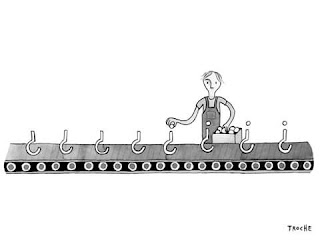Nicolas Poussin, Danse à la musique du Temps (1634, Wallace Collection, London)
-
Só neste Verão, que passou, comecei a dizer aos meus filhos que eles tinham de aprender a estar aborrecidos. As razões devem-se ao facto de começar a ficar impressionada com a maneira como eles acham que tudo tem de ser divertido e interessante, uma espécie de parque de diversões contínuo. Pela primeira vez em dez anos de ser mãe, achei que eles precisavam de aprender a ter paciência para lidar com os momentos menos interessantes, sobretudo quando era necessário.
Não me interpretem mal, não acho que seja obrigatório estar aborrecido, só julgo que é útil saber (aprender a) lidar com o aborrecimento, com o tédio, no fundo, aprender a ter paciência. E até se pode aproveitar esse tempo para parar e olhar (escutar, sentir, ...) o mundo à nossa volta - e até, porque não, descobrir algo sobre nós próprios de que não nos aperceberíamos se estivéssemos em perpétuo movimento.
Ontem descobri um texto, de um psicólogo Adam Phillips, que ia nesse sentido. Sobre uma consulta com uma criança, a certa altura ele diz:
«But at one point, more direct than I intended to be, I asked him if he was ever bored. He was surprised by the question and replied with a gloominess I hadn’t seen before in this relentlessly cheerful child, “I’m not allowed to be bored.” I asked him what would happen if he allowed himself to be bored, and he paused for the first time, I think, in the treatment, and said, “I wouldn’t know what I was looking forward to, ” and was, momentarily, quite panic-stricken by this thought.»
Cf. https://www.brainpickings.org/2014/06/19/adam-phillips-boredom/
Cf. https://www.brainpickings.org/2014/06/19/adam-phillips-boredom/
Luc Tuymans, Silent Music (1992)
Fui então consultar outros links do mesmo (e excelente) blogue Brain Pickings de Maria Popova e encontrei outros artigos interessantes. Num, que se refere a Alan Watts, trata sobre a importância de viver no presente, de não estar constantemente a projectar-se no passado ou a planear o futuro, o que também vai no sentido de ter calma, ter paciência:
«But the future is still not here, and cannot become a part of experienced reality until it is present. Since what we know of the future is made up of purely abstract and logical elements — inferences, guesses, deductions — it cannot be eaten, felt, smelled, seen, heard, or otherwise enjoyed. To pursue it is to pursue a constantly retreating phantom, and the faster you chase it, the faster it runs ahead. This is why all the affairs of civilization are rushed, why hardly anyone enjoys what he has, and is forever seeking more and more. Happiness, then, will consist, not of solid and substantial realities, but of such abstract and superficial things as promises, hopes, and assurances.»
Cf. https://www.brainpickings.org/2014/01/06/alan-watts-wisdom-of-insecurity-1/
Cf. https://www.brainpickings.org/2014/01/06/alan-watts-wisdom-of-insecurity-1/
Carl Larsson, Playing Scales
No mesmo sentido, se insere o texto de Anna Quindlen:
«Life is made up of moments, small pieces of glittering mica in a long stretch of gray cement. It would be wonderful if they came to us unsummoned, but particularly in lives as busy as the ones most of us lead now, that won’t happen. We have to teach ourselves how to make room for them, to love them, and to live, really live.»
Cf. https://www.brainpickings.org/2014/03/11/a-short-guide-to-a-happy-life-anna-quindlen/
Cf. https://www.brainpickings.org/2014/03/11/a-short-guide-to-a-happy-life-anna-quindlen/
Claude Lorrain, The Dance Of The Seasons
Certamente há coisas que temos de planear. Conhecer o passado é necessário para termos consciência da nossa realidade. Fazer planos para o futuro é importante para termos noção do que temos de fazer. Mas também é preciso parar e respirar fundo, sentir o presente. Também há que aprender a não estar sempre a correr, a desejar algo que não se tem ou a lamentar algo que se perdeu.
Deve haver tempo para termos paciência (e por vezes estar aborrecidos) e deve haver tempo para nos divertirmos. Deve haver tempo para fazer o nosso dever, mesmo que seja aborrecido, ou cansativo (e por vezes temos de acelerar o passo).
Defendo, sobretudo, que haja equilíbrio. E às vezes tenho uma certa inveja do tempo lento da vida antes da Revolução Industrial...
Alan Watts também escreveu:
«To understand music, you must listen to it. But so long as you are thinking, “I am listening to this music,” you are not listening.»
-
-
Já agora, os "bolds" nas frases são meus...
-



























